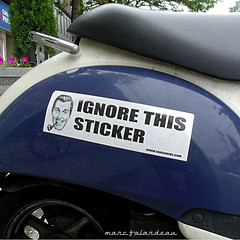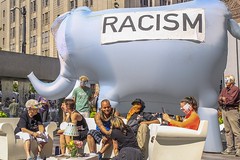Compassion and Fatigue in a Social Media World
Of late, I'm feeling a bit wiped. I know this has a bit to do with the good ole work-life balance, but I'm also struggling with how I continue to engage with the world and the things that I fundamentally know and believe about the world and I would be curious to hear how others grapple meaningfully with these challenges.
Much of this happens as a result of the hyper-narrative of events. What I mean by this is that for several years I've noticed there is a series of cycles around any major news story--especially those which are controversial or horrific that goes something like this:
It's hard for me not to engage in various levels of commentary because they are often infused with ideologies or are clearly evoking similar past events. Whether it's another terrorist attack, a mass-shooting in a public space, or even a manufactured story purposely meant to rile the dominant culture about a supposed threat to their power and prestige, they all come at us in series of articles, news clips, and memes that beg a response; that beg a need to identify inconsistencies, hypocrisies, and misinformation.
This cycle is exhausting to witness and partake in. The media only enhances it with the outrage cycle to produce stories that aren't stories but still suck us in to discussing it (e.g. the Starbucks cup). And it is hard to avoid engaging in it to some degree. To remove one's self from social media doesn't work because it is still likely to be present in news stories, on the television news, and on one's news feeds. To attempt any level of awareness in the world and to not be blasted by it, seems all but impossible.
I often hear people say, "Just ignore it." In fact, I've lost several "Facebook friends" due to my failure to ignore the nature of their posts. But I generally can't ignore it. If I see something wrong--something that alienates or marginalizes already vulnerable populations, then I am compelled to say something. I have trouble letting it slide as to me that seems to be a sign of my own bigotry. That is, if I fundamentally believe in the humanity of all people, regardless of race, color, creed, gender, sex, sexuality, religion, etc, then to chose to only speak up for groups that I more closely identify with seems to reject that idea outright. I can't pick and choose; I'm either vigilant in supporting all groups to the best that I can, or I'm just playing favorites and that means reinforcing or refusing to confront my own innate bigotry.
There's also something about ignoring that I find disconcerting and impossible for me. I know some of the nicest people can happily and purposely ignore something. They will even say, "don't tell me about that" so that they can avoid cognitive dissonance around something in their lives (e.g. the horrific and unsanitary conditions of the animals we eat, the environmental and human degradation of the coffee we drink, the human abuse and exploitation of children and adults for other commodity items like clothes, diamonds, and chocolate). It's very hard to turn off that switch for me and I don't want to turn of the switch per se. I don't want to numb myself or allow myself to ignore it because so much harm is done in the world by our ability to ignore those things which we are not directly affected by.
If I'm not African American, then I don't have to think about what it means to be black, the inherent inequalities at every step of the criminal justice system for African Americans, the numerous other social and cultural inequalities, and how that will impact me. Therefore, when people on Facebook, especially police officers, openly mock, blame, or disregard often with inherent racist posts about #BlackLivesMatter, I get the privilege to ignore it, on the assumption that it is not my problem or it doesn't directly effect me.
If I'm not transgender, then I can ignore the various memes posted by typically hereotsexual men and women that mock Caitlyn Jenner or any transperson of any variety for that matter. I can enjoy the mockery taking place. I don't have to think about what it means to be trans in a culture that regularly kills people because they don't fit into a simplistic gender, sex, or sexuality system. I get to laugh at the post; it doesn't increase my internalized fear for my safety every time I use a public bathroom.
If I'm not Muslim, I don't have to think about what it means to belong to a world religion that like so many other religions, have people who are practicing some bastardized form of it and committing horrific acts in its name. I don't have to constantly walk a line between faith but also communicating that "I'm not 'them', I swear" because people and news media's reductive thinking can't or chooses not to distinguish between terrorist organization and world religion. I don't have to tattoo the American flag on my forehead to avoid questions being raised about whether I should be here, what kind of threat I represent, or what am I doing personally to prevent other Muslims from becoming terrorists, like I'm personally responsible and representative of all Muslims. Instead, I can talk about deporting "them," torturing "them," or even nuking "them" like they are an infestation because I belong to a culture and government that has committed genocide on other peoples, so what's one more.
Ignoring is a privilege afforded to those whose lives are not directly effected by whatever is being ignored (In truth, it does effect all of us as bigotry, injustice, and violence perpetrated upon one group opens up the opportunity for it to happen to all of us). I don't sit well with knowing I have privilege based upon factors that society has deemed more valuable despite such privileges being entirely a matter of birth (e.g. race, ethnicity, class, gender, sex, sexuality, etc) and therefore, when there are ways I can address my own innate privilege, I do my best to do so.
That is the question I grapple with. I don't want to dissent into a Bug's Bunny "Rabbit Season/Duck Season" debate but of course, it so often does happen. I see a post or comment that is troubling, inaccurate, or misrepresents peoples or beliefs and I find it important to respond. In truth, I'm trying to respond to the person, but often the nature of the post makes it clear, they are being purposefully incendiary; it's their American right, of course (insert commentary about who and when "Americans" get to assert such a right).
I often respond often knowing the person who posted it will not listen, respond, or hear what I have to say and if they do, it's from a position of snark or just disregard. I often try to be respectful in my tone (though I do fail at this). Sometimes, I am met with the same respect or the person can identify with the concerns I raise. However, even if this never happened, I'm still compelled to do it because others need to see it.
I provide whatever response I do because I see the need for others who see that post to know that there is a different way; that there are alternatives. I know it's important to voice a counter-view because, it has helped others seeing the same post better understand their own issues with the post or just to know there is an ally out there. I regularly hear from people that appreciate me speaking up to something they were afraid to or unable to comment upon. That this happens by being networked to the person posting the offensive content makes it all the more important because it means that post, regardless of its problematic content has actually helped others become more understanding and aware.
The desire to delete "friends" or unfollow people who post such content is strong and I know many will do this or simply unfollow or block posts. I am often tempted with these options, but I feel it is just another form of ignoring. I don't have to see the bad stuff--I can block the content and not the person so I don't have to engage with it. Inevitably, I will know it's still there, but I can continue with my blissful feed of posts filled with health advice, pop culture interests, and cute cat pics. That just doesn't sit well with me. It seems to me that if I don't have the tolerance to hear what they have to say at all, then I need to consider why be friends with them at all and why do I expect tolerance but do not give tolerance.
Deleting friends doesn't seem like an option either and it's not because I don't want to offend those people or fear that I will eventually end up with no friends. Rather it's that I make conscious decisions to be "friends" with people and I recognize that they will definitely not like everything I post, I should not expect any less from them. More important, these are good people. Yes, they may post things that are problematic, but on the whole they are good people with family and friends, often doing many good things in the world (caring for loved ones, donating to charity, volunteering, etc). That is, the issue I have with them is singular but they are multi-faceted. Deleting them seems to be another form of reductive thinking that I don't want to participate in.
I've shared the above to give people a sense of what I'm doing and why, because I'm hoping there are others out there who have similar views and approaches. I'm curious to hear about your tactics, ideas, and ways of negotiating being a compassionate human in all its forms while being challenged by the problematic and often vitriolic rhetoric in the form of posts, memes, and articles on your social networks.
I certainly will continue to engage in the ways I find are best to do so. I will also find a means of reconciling the need for breaks for mental care with the concern of my privilege to be able to break away from it. But I am curious to know how others negotiate these challenges. What tactics do you employ? How do you often do you engage with content that you find problematic? How do you engage with it? How do you avoid burnout? How do you survive burnout?

By Any Other Nerd Blog by Lance Eaton is licensed under a Creative Commons Attribution-ShareAlike 3.0 Unported License.
Horrific Event Cycle
Much of this happens as a result of the hyper-narrative of events. What I mean by this is that for several years I've noticed there is a series of cycles around any major news story--especially those which are controversial or horrific that goes something like this:
- Horrible event happens.
- Immediately responses to horrific response that mix empathy, anger, and shock.
- Quickly followed by responses criticizing those people and how they responded, which often invoke shame, hypocrisy, and ignorance coupled with bigotry (knowing and caring about this group, but being ignorant of other groups--especially marginalized groups).
- Shortly followed by responses criticizing the critics and damning their insensitivity to the "real tragedy."
- A response by the critics about the insincere responses of the previous responders.
- All of this then gets rolled into critics who provide a meta-commentary, which allows them to comment on larger issues.
- The meta-commentary then is reacted to by all the other critics as twisting words, reductive thinking or some other problem.
- These continue to spiral until another horrible thing happens at which point said commentaries, meta-commentaries, etc are folded into, evoked, or mocked because of the seriousness of the new thing.
It's hard for me not to engage in various levels of commentary because they are often infused with ideologies or are clearly evoking similar past events. Whether it's another terrorist attack, a mass-shooting in a public space, or even a manufactured story purposely meant to rile the dominant culture about a supposed threat to their power and prestige, they all come at us in series of articles, news clips, and memes that beg a response; that beg a need to identify inconsistencies, hypocrisies, and misinformation.
Just Ignore It
This cycle is exhausting to witness and partake in. The media only enhances it with the outrage cycle to produce stories that aren't stories but still suck us in to discussing it (e.g. the Starbucks cup). And it is hard to avoid engaging in it to some degree. To remove one's self from social media doesn't work because it is still likely to be present in news stories, on the television news, and on one's news feeds. To attempt any level of awareness in the world and to not be blasted by it, seems all but impossible.
I often hear people say, "Just ignore it." In fact, I've lost several "Facebook friends" due to my failure to ignore the nature of their posts. But I generally can't ignore it. If I see something wrong--something that alienates or marginalizes already vulnerable populations, then I am compelled to say something. I have trouble letting it slide as to me that seems to be a sign of my own bigotry. That is, if I fundamentally believe in the humanity of all people, regardless of race, color, creed, gender, sex, sexuality, religion, etc, then to chose to only speak up for groups that I more closely identify with seems to reject that idea outright. I can't pick and choose; I'm either vigilant in supporting all groups to the best that I can, or I'm just playing favorites and that means reinforcing or refusing to confront my own innate bigotry.
There's also something about ignoring that I find disconcerting and impossible for me. I know some of the nicest people can happily and purposely ignore something. They will even say, "don't tell me about that" so that they can avoid cognitive dissonance around something in their lives (e.g. the horrific and unsanitary conditions of the animals we eat, the environmental and human degradation of the coffee we drink, the human abuse and exploitation of children and adults for other commodity items like clothes, diamonds, and chocolate). It's very hard to turn off that switch for me and I don't want to turn of the switch per se. I don't want to numb myself or allow myself to ignore it because so much harm is done in the world by our ability to ignore those things which we are not directly affected by.
Ignoring Is a Privilege
If I'm not African American, then I don't have to think about what it means to be black, the inherent inequalities at every step of the criminal justice system for African Americans, the numerous other social and cultural inequalities, and how that will impact me. Therefore, when people on Facebook, especially police officers, openly mock, blame, or disregard often with inherent racist posts about #BlackLivesMatter, I get the privilege to ignore it, on the assumption that it is not my problem or it doesn't directly effect me.
If I'm not transgender, then I can ignore the various memes posted by typically hereotsexual men and women that mock Caitlyn Jenner or any transperson of any variety for that matter. I can enjoy the mockery taking place. I don't have to think about what it means to be trans in a culture that regularly kills people because they don't fit into a simplistic gender, sex, or sexuality system. I get to laugh at the post; it doesn't increase my internalized fear for my safety every time I use a public bathroom.
If I'm not Muslim, I don't have to think about what it means to belong to a world religion that like so many other religions, have people who are practicing some bastardized form of it and committing horrific acts in its name. I don't have to constantly walk a line between faith but also communicating that "I'm not 'them', I swear" because people and news media's reductive thinking can't or chooses not to distinguish between terrorist organization and world religion. I don't have to tattoo the American flag on my forehead to avoid questions being raised about whether I should be here, what kind of threat I represent, or what am I doing personally to prevent other Muslims from becoming terrorists, like I'm personally responsible and representative of all Muslims. Instead, I can talk about deporting "them," torturing "them," or even nuking "them" like they are an infestation because I belong to a culture and government that has committed genocide on other peoples, so what's one more.
Ignoring is a privilege afforded to those whose lives are not directly effected by whatever is being ignored (In truth, it does effect all of us as bigotry, injustice, and violence perpetrated upon one group opens up the opportunity for it to happen to all of us). I don't sit well with knowing I have privilege based upon factors that society has deemed more valuable despite such privileges being entirely a matter of birth (e.g. race, ethnicity, class, gender, sex, sexuality, etc) and therefore, when there are ways I can address my own innate privilege, I do my best to do so.
But How to Engage?
I often respond often knowing the person who posted it will not listen, respond, or hear what I have to say and if they do, it's from a position of snark or just disregard. I often try to be respectful in my tone (though I do fail at this). Sometimes, I am met with the same respect or the person can identify with the concerns I raise. However, even if this never happened, I'm still compelled to do it because others need to see it.
I provide whatever response I do because I see the need for others who see that post to know that there is a different way; that there are alternatives. I know it's important to voice a counter-view because, it has helped others seeing the same post better understand their own issues with the post or just to know there is an ally out there. I regularly hear from people that appreciate me speaking up to something they were afraid to or unable to comment upon. That this happens by being networked to the person posting the offensive content makes it all the more important because it means that post, regardless of its problematic content has actually helped others become more understanding and aware.
There's Always Housekeeping
Deleting friends doesn't seem like an option either and it's not because I don't want to offend those people or fear that I will eventually end up with no friends. Rather it's that I make conscious decisions to be "friends" with people and I recognize that they will definitely not like everything I post, I should not expect any less from them. More important, these are good people. Yes, they may post things that are problematic, but on the whole they are good people with family and friends, often doing many good things in the world (caring for loved ones, donating to charity, volunteering, etc). That is, the issue I have with them is singular but they are multi-faceted. Deleting them seems to be another form of reductive thinking that I don't want to participate in.
Butttt....How Do YOU Deal?
I've shared the above to give people a sense of what I'm doing and why, because I'm hoping there are others out there who have similar views and approaches. I'm curious to hear about your tactics, ideas, and ways of negotiating being a compassionate human in all its forms while being challenged by the problematic and often vitriolic rhetoric in the form of posts, memes, and articles on your social networks.
I certainly will continue to engage in the ways I find are best to do so. I will also find a means of reconciling the need for breaks for mental care with the concern of my privilege to be able to break away from it. But I am curious to know how others negotiate these challenges. What tactics do you employ? How do you often do you engage with content that you find problematic? How do you engage with it? How do you avoid burnout? How do you survive burnout?
By Any Other Nerd Blog by Lance Eaton is licensed under a Creative Commons Attribution-ShareAlike 3.0 Unported License.





Comments
Post a Comment